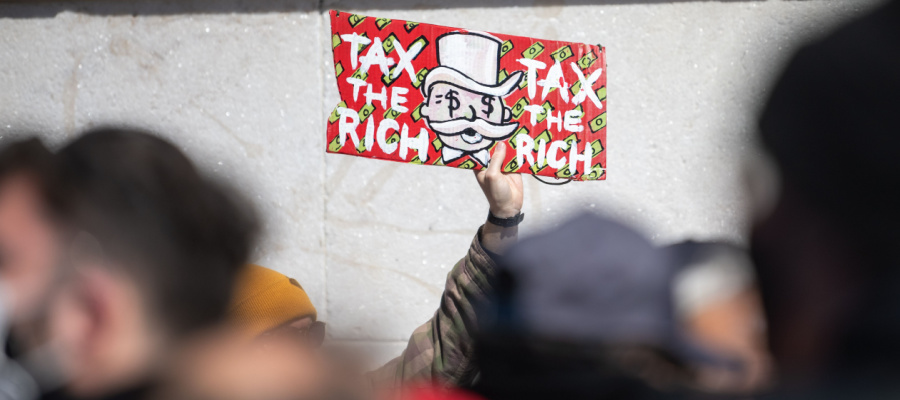UNICEF shames Canada for inequality among children
In an earlier blog Shannon Daub reported on Mark Milke’s assertion that inequality was a lot of humbug. UNICEF has published a report that shows that it is children who bear the burden of inequality and that children are not to blame for it.
When many of us think about UNICEF we think of an organization concerned about children in the world’s poorest countries. But in November UNICEF published a report on children in the richest countries. In one area in particular, Canada does not come off well.
The report, The Children Left Behind, compares 24 of the world’s wealthiest countries for three indicators: material inequality, education inequality and health inequality. Why look at inequality among children? The report states:
The idea that inequality is justified as a reflection of differences in merit cannot reasonably be applied to children. Few would deny that children’s early circumstances are beyond their own control. Or that those early circumstances have a profound effect on those present lives and future prospects. Or that growing up in poverty incurs a substantially higher risk of lower standards of health, reduced cognitive development, of under achievement at school, of lower skills and aspirations and eventually of lower adult earnings, so helping to perpetuate disadvantages from one generation to the next.
None of this is the child’s fault.
The study looks at inequality by measuring the gap between those at the middle of the pack (the median position) with those at the bottom. The critical question, the report says, is just how far behind children should be permitted to fall?
Is there a point beyond which falling behind is not inevitable, not unavoidable but unacceptable, not inequality but inequity?
On educational inequality Canada does pretty well falling only behind Finland, Denmark and Ireland. On health inequality we are in the middle of the group, close to the OECD average. But on inequality in material well being, we land in the bottom group, clustered with Spain, Portugal and Greece with the highest levels of child income inequality.
Income for children, the report says, is the key factor.
The most potent fact about children who fall significantly behind their peers is that, by and large, they are children of families at the bottom end of the socio-economic scale.
The report is based on information from good economic times and cannot report in detail on the impact of the recession. It does note, however, in the United States that great economic growth in recent years,
Did not capture the fact that children who remained below the poverty line fell even further behind. It is therefore essential to ask not only “how many” but “how far.”
What caused the growth in inequality? The report suggests that many governments are spending more on family benefits and social protection but they are swimming upstream against forces like technological innovation and globalization. UNICEF cites a 2008 report (Growing Up In North America) that found:
Inequality of market and disposable income has been increasing in Canada, Mexico and the United States since the 1980s. In particular markets have disproportionately benefited families at the top of the income ladder – though families in every income group have been working longer and harder. The scale of government intervention via public income transfers was not enough to offset the growing gap in market incomes.
So what is the solution? UNICEF cites the OECD report Growing Up Unequal from 2008 saying,
The only sustainable way to reduce inequality…is to stop the underlying widening of wages and income from capital. In particular we have to make sure people are capable of being in employment and earning wages that keep them and their families out of poverty.
Canada is among the worst for income inequality for children but there is special relevance here for British Columbia?
Year after year, in good times and bad, BC continues to have the highest rate of child poverty in Canada. Some steps have been taken such as the Strong Start program and four year old kindergarten. But the most important problem – child poverty – has not been improved.
One specific recommendation in the report is to increase minimum wages, something that has not happened in BC in a decade. Several countries have taken this step. In the United Kingdom the 2010 report of the National Equity Panel argued:
The minimum wage is a powerful tool in reducing labour market inequality.
Here in BC it is not powerful enough. Even an increase to $10 will not be sufficient. What is needed is a living wage policy such as that which was introduced in New Westminster. What is needed is an anti poverty program which many provinces, but not BC, have adopted.
There are other measures that can be taken. Tax policies, social programs and adequate child care can make a difference. But as the report concludes:
If the effort to prevent the unnecessary falling behind of children in different dimensions of their lives is not made, then a fundamental unfairness will continue to shame our pretensions to equality of opportunity – and our societies will continue to pay the price.
Shame our pretensions? When I look at income inequality for children in Canada, and consider that BC has the highest percentage of poor children year after year, I wonder if our governments have any shame at all.


